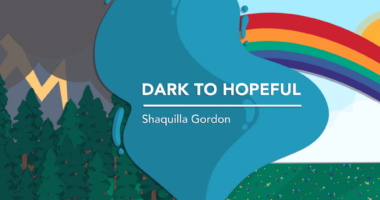What does PNH brain fog feel like?
Cognitive fog, a common PNH symptom, makes all aspects of life challenging

Living with paroxysmal nocturnal hemoglobinuria (PNH) for nearly eight years has shaped how I show up in every part of my life. It’s a quiet battle, mostly invisible to the outside world, but inside, it’s a constant balancing act.
One of the most difficult and misunderstood symptoms I face is brain fog. It’s not the kind of forgetfulness that comes with being tired or overworked. It’s a disorienting, frustrating haze that makes it hard to think, focus, or even feel like myself.
As a financial analyst, I’ve built a career on being detail-oriented and sharp. But there are days when my brain just doesn’t cooperate. I’ll stare at spreadsheets, reread the same sentence 10 times, or forget what a colleague just told me. It feels like trying to run through water while everyone else seems to move ahead with ease.
But the hardest part doesn’t happen at work. It’s at home with my daughters.
I’m a mom to two incredible teenage girls. They are funny, strong-willed, and full of life. They need me to be present, to listen, to help with homework, to remember who needs to be picked up from where, and to just be there. And yet, there are days when I feel like I’m floating outside of myself, trying desperately to stay grounded in a conversation I can barely process.
I remember one particular evening vividly. My older daughter was talking about something that happened at school, something that really mattered to her. But my mind was foggy, and I caught only fragments of her words. I nodded, tried to piece it together, but I could tell she knew I wasn’t fully there. Her eyes dimmed a little, and my heart broke. That moment haunted me — not because I didn’t care, but because I couldn’t connect. That’s what brain fog steals from you: connection.
It’s easy to feel like I’m failing, even though I know I’m doing my best. I’ve read that brain fog is a common symptom of PNH, caused by the fatigue, low oxygen levels, and inflammation the disease brings. Cognitive symptoms are real but often aren’t acknowledged. Researching online has helped me understand the biological roots of what I’m feeling. It’s not all in my head, even if it feels that way.
I’ve had to learn to give myself grace. I’ve learned to apologize when I miss something and celebrate the days when I’m more clear-minded. My daughters have seen me cry, but they’ve also seen me get back up. And I hope, if nothing else, it teaches them that strength isn’t about being perfect, it’s about being present, even in the struggle.
PNH hasn’t taken away my love for my children, my work, or my life. But it has asked me to reimagine what strength looks like. Sometimes strength is choosing to keep going through the fog.
Note: PNH News is strictly a news and information website about the disease. It does not provide medical advice, diagnosis, or treatment. This content is not intended to be a substitute for professional medical advice, diagnosis, or treatment. Always seek the advice of your physician or other qualified health provider with any questions you may have regarding a medical condition. Never disregard professional medical advice or delay in seeking it because of something you have read on this website. The opinions expressed in this column are not those of PNH News or its parent company, Bionews, and are intended to spark discussion about issues pertaining to paroxysmal nocturnal hemoglobinuria.








Jason
Thanks For Sharing your Journey Warrior..We got this journey Together..
#pnhstrongnpositive